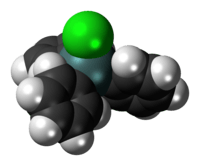Triphenyltin chloride
 | |
 | |
| Names | |
|---|---|
| IUPAC name
chlorotriphenylstannane | |
| Identifiers | |
| 639-58-7 | |
| ChEMBL | ChEMBL515580 |
| ChemSpider | 12023 |
| Jmol interactive 3D | Image |
| PubChem | 12540 |
| |
| |
| Properties | |
| C18H15ClSn | |
| Molar mass | 385.4747 g/mol |
| Appearance | colourless solid |
| Melting point | 108 °C (226 °F; 381 K) |
| Boiling point | 240 °C (464 °F; 513 K) |
| organic solvents | |
| Except where otherwise noted, data are given for materials in their standard state (at 25 °C [77 °F], 100 kPa). | |
| | |
| Infobox references | |
Triphenyltin chloride is an organotin compound with formula Sn(C6H5)3Cl. It is a colourless solid that dissolves in organic solvents. It slowly reacts with water. The main use for this compound is as a fungicide and antifoulant.[1]
Hazards
Triphenyltin chloride has been found to cause an increase in post-implantation embryonic loss as well as implantation failure in rats.[2] It also caused detrimental effects on body weight, testicular size and structure, and decreased fertility in Holtzmann rats.[3]
References
- ↑ Davies, A. G. (2004). Organotin Chemistry. Weinheim, Germany: Wiley-VCH. ISBN 3-527-31023-1.
- ↑ Ema, M. (2000). "Reproductive and developmental toxicity of triphenyltin chloride in rats". Congenital Anomalities (Osaka, Japan: National Institute of Health Sciences) 40 (1): 8–13. doi:10.1111/j.1741-4520.2000.tb00903.x. ISSN 0914-3505.
- ↑ Golub, M. S. (2006). Metals, Fertility, and Reproductive Toxicity. CRC Press. pp. 28–31. ISBN 0-415-70040-X.
This article is issued from Wikipedia - version of the Friday, March 27, 2015. The text is available under the Creative Commons Attribution/Share Alike but additional terms may apply for the media files.